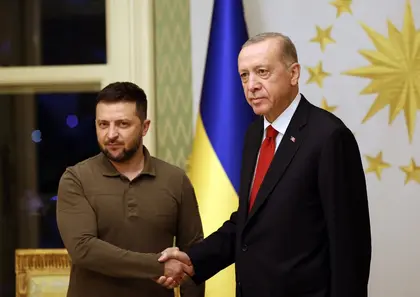President Volodymyr Zelensky on Saturday secured Turkey’s crucial backing for Ukraine’s NATO aspirations after winning a US pledge for cluster munitions that could inflict massive damage on Russian forces on the battlefield.
Washington’s decision to deliver the controversial weapons -- banned across a large part of the world but not in Russia or Ukraine -- dramatically ups the stakes in the war, which entered its 500th day Saturday.
JOIN US ON TELEGRAM
Follow our coverage of the war on the @Kyivpost_official.
Zelensky has been travelling across Europe trying to secure bigger and better weapons for his outmatched army, which has launched a long-awaited counteroffensive that is progressing less swiftly than Ukraine’s allies had hoped.
He called the latest US arms package “timely, broad and much-needed”, tweeting that it “will provide new tools for the de-occupation of our land”.
US President Joe Biden admitted that supplying Ukraine with weapons that are capable of covering several football fields with hundreds of multiple small explosives was “a difficult decision”.
“And by the way, I discussed this with our allies,” Biden told CNN. “The Ukrainians are running out of ammunition.”
- Civilian toll -
Humanitarian groups strongly condemn the decision to supply cluster munitions, which can go undetonated and potentially endanger civilians for years to come.
Defending the US move, National Security Advisor Jake Sullivan argued there was “a massive risk of civilian harm if Russian troops and tanks roll over Ukrainian positions and take more Ukrainian territory”.

Eurotopics: Who Can Ukraine Count on in 2025?
Russian officials issued no immediate response.
As the war passed the 500-day mark, the United Nations condemned the civilian cost inflicted.
More than 9,000 civilians, including over 500 children, have been killed since Russia’s February 24, 2022 invasion, the UN’s Human Rights Monitoring Mission in Ukraine said in a Friday statement, though rights experts have previously warned the real count is likely far higher than what is being tallied.
The monitoring mission said three times as many civilians were killed in the last 500 days as during the previous eight years of hostilities in eastern Ukraine.
- Kremlin watching closely -
Zelensky’s talks in Turkey -- a strategic member of NATO on uneasy terms with the West -- were being watched closely by the Kremlin, which has tried to break its international isolation by cultivating strong relations with President Recep Tayyip Erdogan.
Erdogan has tried to portray himself as a neutral mediator, substantially boosting wartime trade with Russia while supplying Ukraine with drones and other weapons that helped keep Kremlin forces from seizing Kyiv in the first weeks of war.
But while reaffirming his longstanding call for both sides to enter peace negotiations, Erdogan risked drawing the ire of Russian President Vladimir Putin by delivering unequivocal support for Ukraine’s NATO aspiration.
“There is no doubt that Ukraine deserves membership of NATO,” Erdogan told reporters in Istanbul.
While Zelensky is pressing for NATO membership “now”, the White House has urged restraint and said plainly it would not happen at next week’s summit in the Lithuanian capital Vilnius.
Erdogan meanwhile said he will personally brief Putin on the negotiations when the Kremlin chief makes his first visit to Turkey since the invasion next month.
The Turkish leader said he and Putin will discuss possible prisoner swaps, as well as a possible extension of a deal brokered last year under which Ukraine was able to ship grain to the global market.
The deal will expire on July 17 unless Russia agrees to its renewal.
- ‘Progress’ on nuclear inspections -
The head of the UN’s nuclear watchdog said on Friday that it was “making progress” on inspecting several areas of the Zaporizhzhia nuclear plant in Ukraine, after claims it had been mined.
Ukraine and Russia have accused each other of planning a provocation at the Russia-controlled site, raising alarm over the threat of radioactive disaster at Europe’s largest nuclear plant.
Ukraine’s military this week claimed “external objects similar to explosive devices” had been placed on the outer roof of the third and fourth reactors at the site.
Officials from the International Atomic Energy Agency had been able to “complete the tours of the cooling ponds and other places”, IAEA chief Rafael Grossi said in Tokyo.
They had “not seen any indications of explosives or mines”, he said, although he added IAEA officials had not yet been able to visit the facility’s rooftops.
Rescuers on Friday found a 10th body in the rubble of buildings in Lviv after the biggest Russian missile attack on civilian infrastructure in the western Ukrainian city since the invasion, its mayor said.
The strike also wounded 42 people, including three children, Ukraine’s interior ministry said.
You can also highlight the text and press Ctrl + Enter






